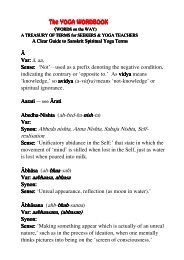Words on the Way - Muz Murray Mantra Yoga Master
Words on the Way - Muz Murray Mantra Yoga Master
Words on the Way - Muz Murray Mantra Yoga Master
You also want an ePaper? Increase the reach of your titles
YUMPU automatically turns print PDFs into web optimized ePapers that Google loves.
Introducti<strong>on</strong><br />
<str<strong>on</strong>g>Words</str<strong>on</strong>g> <strong>on</strong> <strong>the</strong> <strong>Way</strong> - The <strong>Yoga</strong> Wordbook<br />
The Golden Glossary of Philosophical, Mystical & Spiritual Sanskrit<br />
Refreshingly simplified and readable explanati<strong>on</strong>s of deeply esoteric<br />
Philosophical and mystical terms, devoid of professorial obscurantism.<br />
“There’s glory for you,” said Humpty-Dumpty.<br />
“I d<strong>on</strong>’t know what you mean by ‘glory,’” Alice said.<br />
Humpty-Dumpty smiled c<strong>on</strong>temptuously. “Of course you d<strong>on</strong>’t—till I tell you.<br />
“I meant ‘<strong>the</strong>re’s a nice knock-down argument for you,” said Humpty-Dumpty.<br />
“But ‘glory’ doesn’t mean ‘a nice knock-down argument’” Alice objected.<br />
“When I use a word,” Humpty-Dumpty said, in a ra<strong>the</strong>r scornful t<strong>on</strong>e, “it means<br />
just what I choose it to mean—nei<strong>the</strong>r more nor less.” *<br />
And alas, this seems to be <strong>the</strong> case with so many gurus and writers of spiritual texts in India.<br />
It is for this reas<strong>on</strong> that this compilati<strong>on</strong> is written by way of encouragement for those spiritual<br />
aspirants ei<strong>the</strong>r new to <strong>the</strong> teachings, or even for those deeply into <strong>the</strong> philosophy of yoga. (And also<br />
because I always desperately wanted such a book myself, when I was a young seeker wrestling with<br />
<strong>the</strong> badly written and excruciatingly inexplicable texts of so many gurus and pundits in India).<br />
Seekers can often get completely lost, c<strong>on</strong>fused and discouraged by <strong>the</strong> welter of unfamiliar and<br />
unexplained Sanskrit words that are so liberally sprinkled throughout <strong>the</strong> Indian philosophical &<br />
spiritual writings.<br />
My idea is not to compile a dicti<strong>on</strong>ary for scholars. This is not a dicti<strong>on</strong>ary, so you w<strong>on</strong>’t find<br />
every Sanskrit word in it. It is a comprehensive Working Glossary for <strong>the</strong> ordinary seeker.<br />
(The full Indian Sanskrit Dicti<strong>on</strong>ary is called <strong>the</strong> Nighanthu).<br />
Most of us <strong>on</strong>ly want to understand <strong>the</strong> spiritual c<strong>on</strong>cepts with which we are trying to grapple.<br />
Unfortunately, <strong>the</strong> great majority of writers of spiritual booklets in India automatically pepper <strong>the</strong>ir<br />
texts with Sanskrit terminology without any explanati<strong>on</strong> or qualificati<strong>on</strong>, <strong>on</strong> <strong>the</strong> assumpti<strong>on</strong> that <strong>the</strong>y<br />
are self-evident household words to every Hindu. But even in India this is not <strong>the</strong> case. The majority<br />
of Indians are totally unfamiliar even with many of <strong>the</strong> Sanskrit terms known to every yoga student<br />
in <strong>the</strong> West. And very few have any understanding of <strong>the</strong> deeper meaning of spiritual and<br />
philosophical terms. Even erudite Indian writers who believe <strong>the</strong>y are writing clearly and simply for<br />
any<strong>on</strong>e to understand, often have <strong>the</strong> habit of making <strong>the</strong>ir writings incomprehensible to <strong>the</strong> layman,<br />
by tossing in Sanskrit words at every opportunity in order to show off <strong>the</strong>ir scholarship. For<br />
example, here is an example of a typical text you might encounter:<br />
“The prana, by nature, is rajasika because its vritt in <strong>the</strong> form of karma is present in chitta and so<br />
in <strong>the</strong> sattvika state of chitta God should be repeatedly invoked by making pranava mantra <strong>the</strong><br />
means of knowledge.” 1<br />
Now that should be clear enough for anybody, right And this kind of writing is typical of <strong>the</strong><br />
average type of text you might pick up in India. Even <strong>the</strong> prolific Swami Sivananda of Rishikesh,<br />
who generally made his writings as simple as possible, often falls into <strong>the</strong> same habit, as in <strong>the</strong><br />
following example:<br />
3



